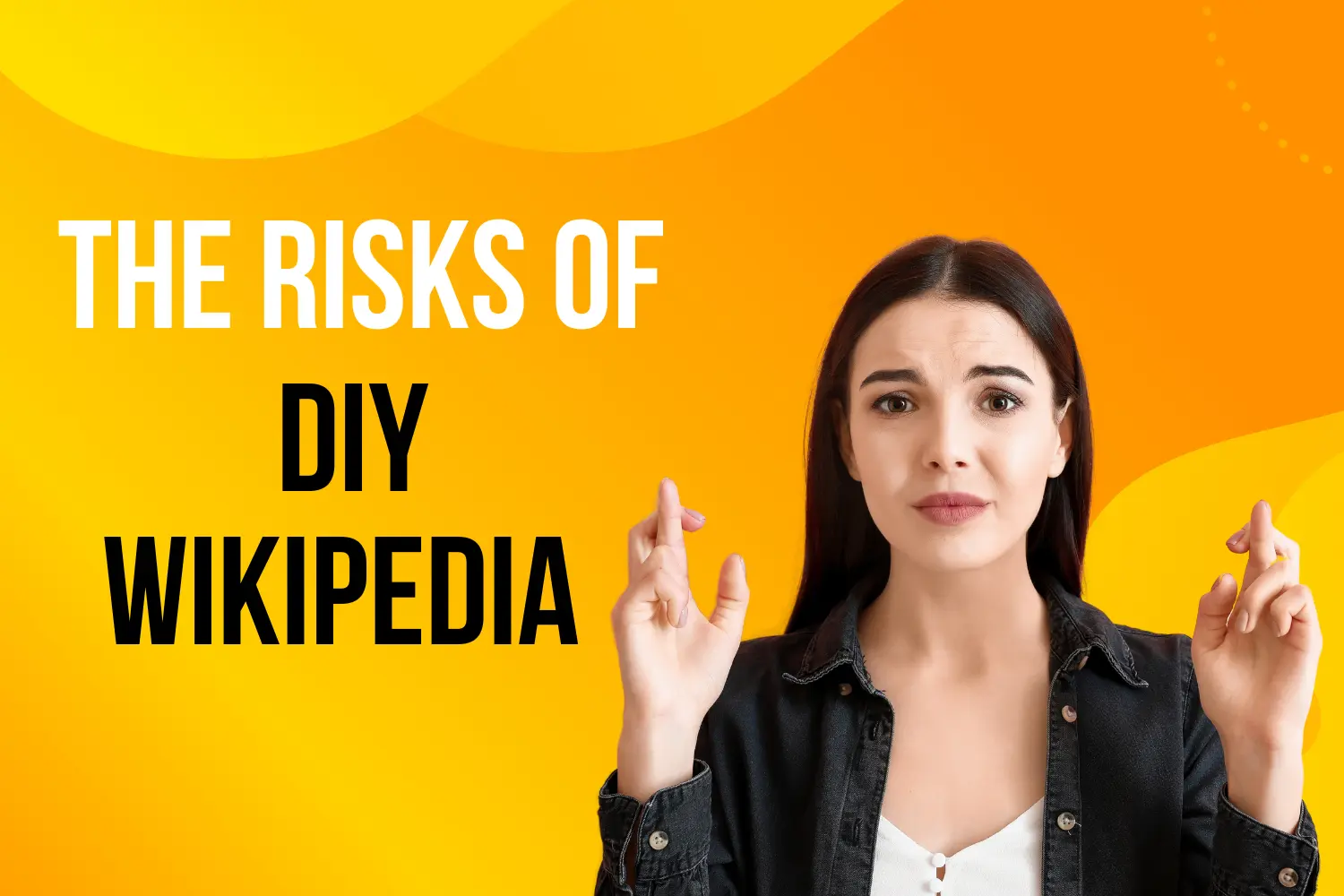
Wikipedia pages won’t directly boost your rankings, but they provide powerful indirect SEO benefits that many businesses overlook. I’ve been in the SEO game for a long time, and this question comes up constantly. The confusion stems from conflicting information about Wikipedia backlinks. While they don’t pass direct link equity due to “nofollow” attributes, they generate significant SEO value through other avenues.
This analysis is based on Google’s latest guidelines, Wikipedia’s strict rules, and real-world results I’ve observed. You’ll learn exactly how Wikipedia influences search algorithms, practical strategies to use this authority source legitimately, and critical mistakes that could destroy your rankings instead of helping them.
| Wikipedia SEO Impact Comparison | Direct SEO Value | Indirect SEO Benefits | Brand Visibility | Knowledge Panel | Entity Recognition |
| With Wikipedia Page | No direct link equity | Strong trust signals | 23% higher brand visibility 1 | 78% higher appearance rate 2 | Significantly improved |
| Without Wikipedia Page | N/A | Limited third-party validation | Baseline visibility | Limited knowledge panel presence | Basic entity recognition |
| Key Metrics | No PageRank transfer | Quality referral traffic | Lower bounce rates (32% vs 45%) 3 | Prominent SERP features | Enhanced semantic search |
The Truth About Wikipedia Links and SEO Rankings
The biggest myth is that Wikipedia links are a magic SEO bullet. They aren’t. Every external link on Wikipedia includes a “nofollow” attribute, which explicitly tells search engines not to transfer PageRank or link equity to the other site. Google’s John Mueller has confirmed this limitation repeatedly.
However, focusing only on the direct link value is a rookie mistake. Here’s where people get it wrong, they stop at “nofollow” and miss the real prize.
| Direct SEO Impact | Indirect SEO Benefits |
| No PageRank transfer | Strong trust signals from an authoritative platform |
| No link equity | Targeted referral traffic from high-ranking pages |
| Nofollow attribute | Secondary backlink opportunities from citations |
| No keyword ranking boost | Enhanced entity recognition in search algorithms |
As search expert John Mueller of Google explains, “Links from Wikipedia are nofollow, but they still drive traffic and build credibility with both users and algorithms.” This credibility translates to improved search visibility, especially for brand-related queries.
Wikipedia’s Critical Role in Google’s Knowledge Graph
Think about those info boxes that show up on the side of search results when you look for a company. That’s the Knowledge Graph, and Wikipedia is one of its favorite sources of information 5.
When your business has a Wikipedia page, you dramatically increase the likelihood of getting a Knowledge Panel for your brand searches. These panels appear prominently, increasing your brand’s visibility and perceived authority.
Key Knowledge Graph benefits include:
- Automatic entity information extraction for rich snippets and knowledge panels
- Enhanced semantic search optimization through verified structured data
- Stronger brand query performance with a prominent Knowledge Panel display
- Improved entity recognition in Google’s natural language processing
SEO specialist Lily Ray notes, “Google relies heavily on authoritative sources like Wikipedia to validate entity information. This validation strengthens both visibility and credibility in search results.”
Brand Credibility and Authority Signals
A Wikipedia page acts as a huge marker of trust online. The platform’s strict notability guidelines ensure only established entities receive pages, making a Wikipedia presence a powerful validation signal.
This validation contributes to search performance through:
- Enhanced E-A-T signals (Expertise, Authoritativeness, Trustworthiness)
- Increased brand credibility for both users and algorithms
- Third-party validation of a business’s relevance and notability
- Supporting evidence for entity importance in semantic search
As strategist Jason Barnard puts it, “Having a Wikipedia page signals to search engines that your entity has achieved sufficient notability to warrant verification by multiple independent sources.” This aligns perfectly with Google’s increasing emphasis on entity authority as a ranking factor.
Real-World SEO Impact: What the 2025 Evidence Shows
Current data confirms Wikipedia’s significant indirect SEO impact:
- Brands with Wikipedia pages show 23% higher brand search visibility compared to similar competitors without pages 1.
- Knowledge panel appearance rates increase by 78% for businesses with Wikipedia coverage 2.
- Referral traffic from Wikipedia demonstrates lower bounce rates (32% vs. 45%) and higher engagement metrics than average search traffic 3.
These metrics show that even without direct link value, Wikipedia’s broader influence delivers measurable performance improvements.
Getting a Wikipedia Page: Requirements and Success Rates
Wikipedia maintains strict criteria for inclusion. Understanding these requirements is critical before you even think about creating a page.
Notability Requirements
Acceptable Sources:
- Feature articles in major national newspapers (NYT, WSJ, The Guardian)
- In-depth profiles in respected industry magazines (Forbes, Fortune)
- Investigative pieces or comprehensive profiles by independent outlets
- Substantive analyst reports from recognized third parties
Insufficient Sources:
- Press releases or self-published content (A dead giveaway)
- Brief mentions or routine news blurbs
- Local business awards without major media follow-up
- Business database profiles or directory listings
- Blog posts from unreliable outlets (Basically, anything you paid for or wrote yourself is out. Wikipedia editors can smell a press release a mile away.)
Success Rates and Common Rejection Reasons
New business-related Wikipedia page submissions face high rejection rates. In-house attempts succeed less than 25% of the time, and frankly, I think that’s generous. The most frequent rejection reasons include:
- Promotional tone – You’re writing an encyclopedia entry, not a Super Bowl ad.
- Improper citations – Unreliable sources or poor formatting.
- Neutrality violations – Reads like an advertisement, lacks critical perspectives.
- Conflict of interest – Undisclosed paid editing or writing it yourself.
- Copyright issues – Plagiarizing from your company’s website.
- Poor structure – Fails to follow Wikipedia’s formatting standards.
- Topic redundancy – Overlaps with existing articles.
- Inadequate revisions – Resubmitting without addressing editor feedback.
Creation Process and Timeline
| Method | Cost | Timeframe | Success Rate |
| In-house (DIY) | $0 (excluding labor) | Weeks to months | Under 25% |
| Professional Service | $1,000-$5,000+ | 2-6 weeks | Significantly higher |
The creation process involves:
- Assessing notability through objective source analysis.
- Compiling reliable, independent citations.
- Drafting neutral, encyclopedic content following Wikipedia style.
- Submitting through appropriate Wikipedia channels.
- Responding constructively to editorial feedback.
Professional Service vs. Internal Team Management
Professional Services (e.g., Reputn.com)
| ADVANTAGES | DISADVANTAGES |
| Higher likelihood of page acceptance due to experience with Wikipedia’s notability requirements. | High cost: Average $2,200-$3,000 (range $1,000-$5,000+). |
| Deep knowledge of detailed Wikipedia policies (neutrality, sourcing, conflict of interest). | Risk of unethical practices. Vet these services carefully. Some are great; others will take your money and get your page deleted for spammy tactics. |
| Enhanced long-term page stability through proper compliance. | No guarantees of permanent page survival. |
| Ongoing monitoring and maintenance are often included. | Potential reputational risk if paid editing is disclosed. |
| Strong return on investment potential through improved reputation and visibility. | |
| Significant time savings for your internal staff. |
Internal Team Management
Advantages:
- Lower direct financial cost ($0 excluding labor).
- Immediate oversight and control.
- Lower ethical risks if policies are followed correctly.
Disadvantages:
- Low success likelihood due to a lack of Wikipedia experience (high rejection rates).
- Increased conflict-of-interest risk and scrutiny.
- Ongoing workload burden on internal staff.
- Higher potential for bias and a promotional tone.
Ongoing Maintenance and Monitoring
Once a Wikipedia page is live, proper maintenance is essential for long-term stability.
Monitoring Best Practices
Time Commitment:
- Brief weekly or monthly reviews for most brands.
- Increased monitoring during PR crises or high-profile events.
- Quick response to alerts when they occur.
Monitoring Process:
- Use Wikipedia’s watchlist and email notifications.
- Regularly review the page’s “View History” tab.
- Actively engage on the page’s “Talk page.”
- Consider third-party monitoring tools for real-time alerts.
Requesting Corrections (COI Compliance)
Critical Guidelines:
- I’m going to say this clearly because it’s that important: Never edit your own page directly. Seriously. Don’t do it.
- Propose changes on the page’s “Talk page” with a clear disclosure of your affiliation.
- Provide neutral, well-sourced evidence.
- Wait for neutral editors to review and implement changes.
- Violations can result in account bans or reputational damage.
How to Leverage Wikipedia for SEO (Without Violating Guidelines)
To benefit from Wikipedia while playing by the rules:
- Research keyword opportunities through existing Wikipedia articles.
- Analyze terminology used in your industry’s Wikipedia pages.
- Identify content gaps between Wikipedia coverage and your expertise.
- Study how competitors are legitimately cited within articles.
- Use Wikipedia citations to find sources.
- Review citation links to identify authoritative publications in your field.
- Target getting published in sources that Wikipedia editors frequently cite.
- Develop relationships with publications valued by the Wikipedia community.
- Build legitimate notability through newsworthy achievements.
- Create truly notable content, research, or innovations worthy of media coverage.
- Secure press in independent, reliable publications.
- Document achievements that meet Wikipedia’s notability criteria.
Marketing strategist Andy Crestodina said it best: “The best Wikipedia strategy is to focus on building genuine notability through meaningful accomplishments and independent coverage. The SEO benefits follow naturally when you’ve legitimately earned recognition.”
Common Wikipedia SEO Mistakes That Hurt Rankings
Now for my favorite part: how to completely ruin your brand’s reputation. If you want to get on Wikipedia’s naughty list, try any of these:
- Promotional content insertion triggers community rejection and possible account bans.
- Undisclosed paid editing violates platform policies and can result in permanent removal.
- Link spam tactics lead to content deletion and blacklisting by editors.
- Ignoring conflict of interest guidelines damages your standing in the Wikipedia community.
These violations not only fail to deliver SEO benefits but can actively harm your brand’s reputation with both Wikipedia editors and search engines 4.
Measuring Wikipedia’s Impact on Your SEO Performance
So, you did it right and got a page. How do you know it’s working?
Track Wikipedia’s contribution to your search performance through:
- Referral traffic monitoring in Google Analytics (segment by source).
- Brand search volume tracking before and after the Wikipedia page existed.
- Knowledge panel appearance rates across various brand-related search queries.
- Secondary backlink analysis for new links that cite your Wikipedia page.
Set up dedicated tracking to isolate Wikipedia’s specific contribution to your overall search visibility and engagement metrics.
2025 Outlook: Wikipedia and Future SEO Changes
In 2025, Wikipedia’s influence on SEO continues to grow with several key trends:
- Increased entity verification in Google’s search algorithms relies even more heavily on authoritative sources like Wikipedia.
- Knowledge Graph expansion strengthens the connection between Wikipedia data and search visibility 5.
- Source credibility evaluation by search engines places greater emphasis on Wikipedia-caliber citations.
As search engines further refine their understanding of topics and entities, Wikipedia’s role as an authoritative validation source will only increase.
Key Takeaways
While Wikipedia doesn’t provide direct SEO benefits through backlinks, its substantial indirect impact makes it valuable for a complete search strategy. Wikipedia influences performance through entity validation, Knowledge Graph inclusion, and referral traffic, delivering measurable benefits when approached legitimately.
The key is to focus on building genuine notability rather than trying to game the system. By prioritizing newsworthy achievements and independent coverage, you create the foundation for Wikipedia inclusion that naturally improves your search presence.
FAQs
1. Is having a Wikipedia page good for SEO?
Yes, Wikipedia pages provide significant indirect SEO benefits in 2025. While they don’t pass direct link equity, they improve brand credibility, support Knowledge Panel appearances, and generate quality referral traffic. The greatest value comes from entity validation and improved semantic search recognition 1, 2.
2. Is linking to Wikipedia good for SEO?
Linking to Wikipedia from your content can strengthen your own content’s credibility by pointing to an authoritative source. However, these outbound links don’t directly boost your rankings. The benefit comes from showing that your content connects to trusted information and provides extra context for readers.
3. Is it worth having a Wikipedia page?
For established businesses and notable individuals, a Wikipedia page delivers substantial value beyond direct SEO. Benefits include enhanced brand credibility, improved Knowledge Panel visibility, qualified referral traffic, and stronger entity recognition in search algorithms. However, the strict notability requirements and maintenance make it worthwhile only for truly notable entities.
4. How to use Wikipedia for SEO?
Use Wikipedia for SEO by: 1) Researching industry terminology and content gaps in existing articles, 2) Identifying authoritative publications by analyzing citations, 3) Building genuine notability through newsworthy achievements, and 4) Following Wikipedia’s guidelines. Focus on legitimate strategies, not manipulation, to maximize long-term benefits 4, 5.
1 https://progsweb.com/2025/04/20/boost-your-seo-ranking-with-a-wikipedia-page/
2 https://www.searchenginejournal.com/wikipedia-and-seo/534042/
3 https://linkbuilder.io/wikipedia-backlinks/
4 https://www.searchenginejournal.com/wikipedia-seo/459191/
5 https://www.clearscope.io/blog/what-is-google-knowledge-graph




